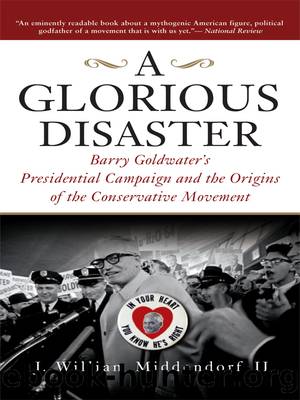A Glorious Disaster by J. William Middendorf II

Author:J. William Middendorf II [J. WILLIAM MIDDENDORF II]
Language: eng
Format: epub
Publisher: Basic Books
Published: 2011-12-31T00:00:00+00:00
There were trinkets of a different sort as well, a string of virulent books written, published, and generally sold by people not connected with either campaign. Millions of copies were printedâone estimate for those on the Goldwater side was 16 million in total. Some were purchased in bulk by local organizations for free distribution; the Goldwater campaign endorsed none and kept them at armâs length. Most popular were A Texan Looks at Lyndon by J. Evetts Haley, which portrayed LBJ as a compulsive wheeler-dealer and political fixer; None Dare Call It Treason by John A. Stormer, which found a Communist under every bed and a one-world government just around the corner; and A Choice Not an Echo by Phyllis Schlaflyâa reasoned argument against the Country Club Republicans.
The other side had Barry Goldwater: A Political Indictment. A Moderate Republicanâs Critical Appraisal of the Man and the Issues, by Edward Paul Mattar III; An Answer to Goldwater, by Millard L. Howell (âThe purpose of this book is to help the American people understand and realize the inherent dangers of ârugged individualisticâ Conservatism and thereby make certain that it remains obsoleteâ); and Barry Goldwater: Extremist of the Right, by Fred J. Cook (which portrayed âGold-waterâthe man, the myth, the menace,â insensitive to the lot of common people, preoccupied âalmost exclusively with the selfish interests of his own well-placed class, . . . surrounded by henchmen like the wily Clif White.â
The only one of these with any claim to lasting relevance was Schlaflyâs book, which helped to launch her career as a conservative activist.
The basic campaign strategy remained âGo hunting where the ducks are.â Except for a few token visits, Barry wouldnât spend much time on New England, New York, or Pennsylvania; instead, he would concentrate on the South (127 electoral votes), the Midwest (especially Ohio and Illinois, 52 votes), a smattering of traditional Republican states (Oklahoma, Kentucky, Arizona, 22 votes; Nebraska, Kansas, Indiana, Wyoming, Colorado, the Dakotas, and the smaller mountain states, perhaps 50 or 60 votes), and, of course, the big prize: California, 92 votes. It was basically the same plan weâd had ever since Clif Whiteâs initial presentation at the December 1962 meeting.
Among the issues to be addressed were Americaâs loss of international prestige, the Berlin Wall, the repudiation of the Monroe Doctrine, the situation with Cuba, the war in Vietnam (which by that point had taken the lives of only a few hundred Americans but threatened to growâBarry was opposed to the war but believed that if we were going to do it, we should do it right), the scandals that swirled around the Johnson administration (especially the tale of Bobby Baker, LBJâs protégé when he was Senate majority leader, who had become very rich through what is generally termed âinfluence peddlingâ), the continuing shift of power from the people to the federal government, the âdismal failureâ to enforce law and order, and âthe discouragement of individual initiative and responsibility among our people.â
Barry wanted to engage LBJ in a televised debateâas he had earlier planned to do with Kennedyâbut we had to overcome some impediments.
Download
This site does not store any files on its server. We only index and link to content provided by other sites. Please contact the content providers to delete copyright contents if any and email us, we'll remove relevant links or contents immediately.
The Secret History by Donna Tartt(19088)
The Social Justice Warrior Handbook by Lisa De Pasquale(12190)
Thirteen Reasons Why by Jay Asher(8910)
This Is How You Lose Her by Junot Diaz(6887)
Weapons of Math Destruction by Cathy O'Neil(6280)
Zero to One by Peter Thiel(5802)
Beartown by Fredrik Backman(5754)
The Myth of the Strong Leader by Archie Brown(5507)
The Fire Next Time by James Baldwin(5446)
How Democracies Die by Steven Levitsky & Daniel Ziblatt(5219)
Promise Me, Dad by Joe Biden(5153)
Stone's Rules by Roger Stone(5088)
A Higher Loyalty: Truth, Lies, and Leadership by James Comey(4964)
100 Deadly Skills by Clint Emerson(4925)
Rise and Kill First by Ronen Bergman(4789)
Secrecy World by Jake Bernstein(4753)
The David Icke Guide to the Global Conspiracy (and how to end it) by David Icke(4720)
The Farm by Tom Rob Smith(4513)
The Doomsday Machine by Daniel Ellsberg(4490)
